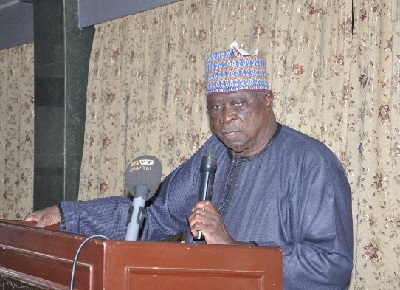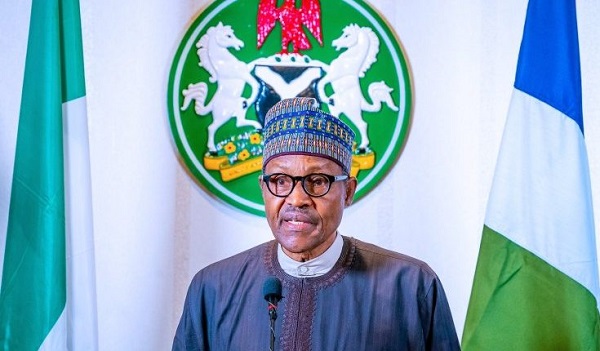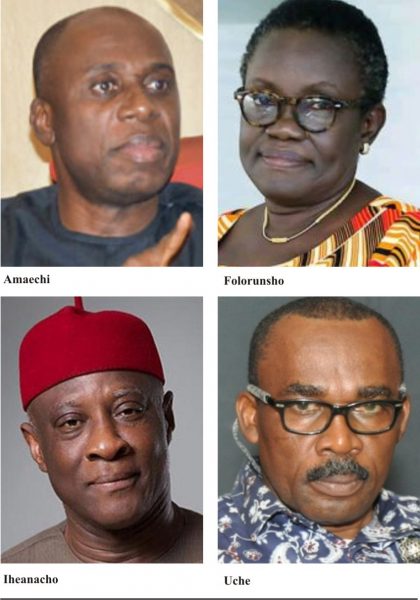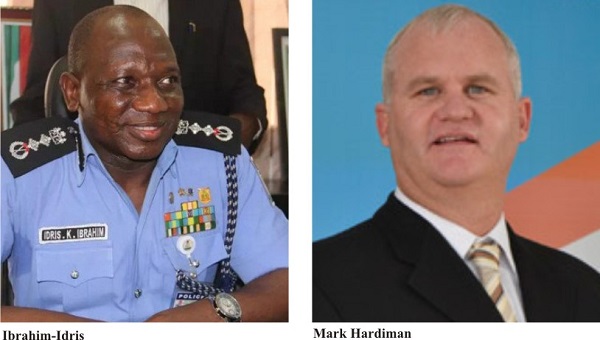X-RAYING THE COMPLIANCE LEVEL TO THE ‘COLUMBUS DECLARATION’ BY THE NIGERIA CUSTOMS SERVICE – Nweke.

The Columbus declaration emerged from the UNCTAD/WTO trade efficiency symposium of October 1994, which explained the principles a modern Customs Administration should observe and implement.
At this period of notable changes in Customs Administration in Nigeria, it is important to review the compliance level to this critical Customs modernization tool in Nigeria.
The modernization conceptualization and evolution of the Nigeria Customs Service was dated under the military administration of General Abacha in 1994 with its National developmental programme tagged Vision 2010. With the benefit of hindsight, it has become imperative to take a cue from this point, and make recommendations as to the stages of implementation processes and noticeable impact so far, as follows:
RECOMMENDATION # 1 – STRATEGIC PLANNING: “Customs authorities should, in consultation with other interested parties, clearly define their corporate objectives and develop and publish an overall Strategic plan which sets out the manner in which it is intended to achieve these objectives”.
- OBSERVATORY NOTES: Each Successive Customs administration comes up with one point administration agenda or the other, more often than not, without much success. However the last administration led by Abdullahi Inde Dikko, made reasonable effort to show a clear template using responsible partnership, collaboration, massive sensitization as its objective indicator for an increased revenue drive and generation to the trading public.
It is pertinent to advice the New CGC to show and educate the trading public and Nigerians with an achievable templates, a road map or the manner it intends to achieve its administrative agenda of : Reform, Restructure and Increase the Revenue of the Customs”. This approach is expected to engender compliance culture.
RECOMMENDATION # 2 – CUSTOMS FORMALITIES: “Customs authorities should urgently examine their existing practices and institute a programme of reform of those procedures that are identified as inefficient or redundant”.
- OBSERVATORY NOTES: Evolving from one administration to the other, with regards to the flexible and dynamic nature of the international trading environment, Customs simplifications and harmonization of processes and procedures are not static in application but highly dynamic. The last administration exhibited greater commitment to the evolution of e-commerce and purposeful automation process, but much is still desirous in view of the ever -changing dynamic trading environment. It is instructive for the New CGC to set up a Committee comprising critical stakeholders to reexamine the prevailing practices and procedures with intent to identifying inefficient or redundant procedures and practices.
RECOMMENDATION # 3 – INFORMATION TECHNOLOGY: “Customs authorities should make maximum use of information technology to assist them in the efficient performance of their duties”.
- OBSERVATORY NOTES: Though the achievement recorded so far in this regards is commendable, but this should be taken further and sustained. There is need to go full automation where all stakeholders are linked and interface with each other online.
Information Technology application under this recommendation should be in total compliance to the provisions of the Transitional Standard 6.9 of the Kyoto Convention on IT- Related Provisions, which states: “The Customs shall use information technology i.e IT and electronic commerce i.e e-commerce to the greatest possible extent to enhance Customs Control”, and Standard 7.1 states: ” The Customs shall apply IT to support Customs operations, where it is cost-effective and efficient for the Customs and for the trade. The Customs shall specify the conditions for its application”.
The above Standard, especially, Standard 7.1, should serve as an application template to Recommendation 8, as noted below.
RECOMMENDATION # 4 – RISK MANAGEMENT: “Customs authorities should ensure the effective use of scarce manpower resources by using risk assessment, profiling, selectivity and targeting techniques to identify high risk consignments for physical examination”.
- OBSERVATORY NOTES: Serious determination and commitment were demonstrated by the last administration in the actualization of the above quest. Till date selectivity and targeting techniques seem to be lopsided due to the malfunctioning of the Scanning Machines. Most of them seem to be in a state of comastose. At the initial stage the Scanners were under-utilized before its present state of Dilapidation. However, the New CGC is encouraged to Invest seriously in the Area of Scanners Servicing and acquisitions with a consideration to boosting and reconciling the Risk Management Capacities of the PAAR Ruling Center Risk management tool and the Scanners tool.
RECOMMENDATION # 5 – PRE-ARRIVAL PROCESSING: “Customs authorities should take steps to make available facilities for Pre-arrival processing of transactions which can deliver significant trade facilitation benefits with appropriate safeguards without compromising the control objectives of Customs”.
- OBSERVATORY NOTES: This has been achieved through the development of the Nigeria Trade Hub and Pre-arrival assessment report applications since 2013. For sustainability sake, the provision of the Recommendation number2 above is applicable. The import and export value applications and processing at the PAAR Ruling Center, should be improved further, making it more interactive for the declarant to argue its value and answer any raised queries on line, this is in total adherence to the provisions of the Article 20 – Agreed Customs Valuation- ACV Methodology of the General Agreement on Trade and Tariff – GATT,’ 94.
RECOMMENDATION # 6 – SEGREGATION OF CLEARANCE PROCESSES: “Customs authorities should examine closely the possibilities of speeding up the process of goods released based on a minimum essential information”
- OBSERVATORY NOTES: The Article 10 and 13 of the WTO/Valuation Agreement are strengthened by the Provisions of protocol 8:2 of the Ministerial Decisions at Doha. Encouraging the National Customs to develop its National Imports Data Bank and encourage the exchange of information between Customs of Importing and Exporting Countries, with respect to imports or product valuation decision process. The New CGC is encouraged to improve further on this, and put a final stop to the practice where officers resort to the use of the internet prices to value an importation.
RECOMMENDATION # 7 – COORDINATION OF OFFICIAL INTERVENTIONS: “Governments should, where possible, provide for coordinated interventions by the different agencies concerned with cargo clearance or invest responsibility for cargo clearance activities in one single authority i.e. Customs.
- OBSERVATORY NOTES: There is the urgent need to further strengthen the Nigeria Customs Information Integrated warehouse known as NICIS. Nigeria Customs should be supported by the Government to officially serve as the “Lead Agency” while ensuring strict compliance automation of all agencies and other stakeholders. This will boost the application of Recommendation Number 5 above and further boost trade Facilitations quest of the Government.
RECOMMENDATION # 8 – CUSTOMS VALUATION: “Customs authorities should simplify procedures for determining Customs value through the use of the WTO Valuation Agreement as administered by the WCO”.
- OBSERVATORY NOTES: As observed in the Recommendation Number 6 above, all import valuation applications from either the Ruling Center or at Point of Cargo Inspection and Releasing must be in total adherence to the provisions of the Agreed Customs Valuation methodology. This practice will further boost reasonable import value assessment and complement compliance.
Therefore, it is instructive to note in this regards, the need for adherence to international accepted standards, using Computer application in determining the value for imported products ( see Standard 7.2 of the Kyoto Convention – IT-Related Provisions).
RECOMMENDATION # 9 – BROADEN TAX BASE: “Government should endeavor, where possible and when high Customs tariffs are developed for national revenue, to broaden their tax base so that Customs tariffs may be moderated thereby discouraging evasion of taxes and facilitating enforcement”.
- OBSERVATORY NOTES: The compliant level and achievement recorded in this aspect are commendable. Government has broadened its tax base by using the Service to collect other approved taxes. In addition, the Introduction of the Traders Identification Number under a joint working arrangement between the Service and Federal inland Revenue Services – FIRS added impetus and soared up tax payment compliance to the system.
RECOMMENDATION # 10 – CO-OPERATION WITH TRADERS: “Governments should take steps to foster a cooperative rather than a confrontational approach to Customs operations e.g. Using the MOU programs of the WCO greater cooperation between the Customs and commercial operators”.
- OBSERVATORY NOTES: The Last Customs administration fostered and maximized this concept to its advantage. The regime was indeed characterized with defined responsible partnership programs, collaborations, corporations and strategic alliance both with the Trading publics (Formal and Informal sectors),within and outside the Country.
In adherence to the provisions of WCO Safe Standard Frame Works, for Customs administration to evolve and the inclusion of Private Sector Consultative Groups – PSCG in its modernization efforts.
The effective implementation of this recommendation complies with the provision of Standard 7.3 of the Kyoto Convention -IT-Related Provisions (General Annex), which states: “The introduction of information technology shall be carried out in consultation with all relevant parties directly affected to greatest extent possible”.
For the record, it is important to note that, the Service held a town hall meeting with over 1000 international traders in attendance at the International Trade Fairs Complex, in 2012. This was followed by the Constitution and inauguration of the Customs Consultative Committee -CCC, with it’s National Secretariat at Harvey Road.
The New CGC is encouraged to improve and sustain this drive.
RECOMMENDATION # 11 – CUSTOMS INTEGRITY: “Governments should take steps to ensure the highest level of integrity and professional standards within their Customs service. The measures identified by the WCO in the Arusha Declaration on Integrity in Customs should be implemented”.
- OBSERVATORY NOTES: Pursuance to Customs Integrity, the last administration made giant strides towards the effective investment and implementation of Recommendation Number 3 above to the actualization of Customs Integrity.
The Development of Training/Educational Infrastructure and ICT driven administrative Office Complexes and operations is highly commendable. In addition, different training and retraining programs, especially on Information and Communication Technology (ICT) Compliant Trainings were organized for the officers within the rank and files. Apart from the Training Collage Facility, M.O.U was entered with other Education Training Institutions.
Deliberate and purposeful investment was made in this regard. The idea is that with an ICT Compliant Customs environment, e-transaction, e- commerce, e- clearance will evolve successfully thereby drastically reducing human contact with the Cargo, which in turn facilitate trade and thereby preserving Customs integrity.
Indeed, the said implemented recommendation number 3 is gradually boosting the integrity and image of the Officers and the Service in general. Today one can encounter Thousands of Customs officers with outstanding integrity amidst the so-called corrupt officers. The New CGC is hereby encouraged to sustain this process, over time, with a clear Code of conduct and supervision, integrity goals will be achieved.
It is a credit to our country that the Customs Training Facility at Gwagwalada, now serves as an International destination Center for academic- excellence /citadel of knowledge. With a defined training and retraining Courses in place, career integrity is expected to get better and better by the day.
One critical aspect of this recommendation 3 has not addressed effectively is the Complementary training of the Customs Agents. Just like there cannot be a compliant importer without compliant Freight Forwarders, so also Customs Reform cannot be complete without reforming the Customs Agents.
RECOMMENDATION # 12 – AVOID PRESHIPMENT INSPECTION: “Governments should institute reform programs aimed at enhancing the efficiency and effectiveness of their Customs services thereby avoiding , as far as possible , the need to use the services of PSI agencies to carry out Customs related activities”.
- OBSERVATORY NOTES: After much resistance, Government put an end to Pre-shipment inspection and adopted the Destination Inspection Agents -DIA’s / Scanner Service Providers Agents- SSPA’s. To take a step further, the Nigeria Customs Service has successfully taken over the Destination Inspection Scheme and has been effectively implementing it to the acceptance of the Government and the Trading public.
RECOMMENDATION # 13 – REGULATION OF AGENTS/BROKERS: “Governments should consider setting minimum standards for shipping agents , freight forwarders and Customs clearing agents/brokers or encourage these professions to set their own standards and monitor performance thereby reducing delays in release of goods”
- OBSERVATORY NOTES: As noted earlier in Recommendation 11 above, there is urgent need for the Service to Partner with the Council for the Regulation of Freight Forwarding Practice in Nigeria – CRFFN, established by Act 16, 2007.
As provided in the Act, the Council undertakes, promotes and facilitates the Professional Skill acquisition, sets professional Code of Conduct, discipline/Standard of Practice, sets minimum qualification, undertakes constant training and retraining Courses/Programs, Maintains a Disciplinary Tribunal to sanction ailing practitioners, etc.
Once Professionalism in the Freight Forwarding industry receives a boost, Customs operations with regards to cargo clearance will attain its compliant quest, revenue and trade facilitation goals.
RECOMMENDATION # 14 – CUSTOMS TO CUSTOMS EXCHANGE OF DATA: “Customs should enhance their controls and facilitate cargo though exchange of import and import data on a bilateral or multilateral basis in accordance with the laws and regulations concerning disclosure of information”.
- OBSERVATORY NOTES: It’s pertinent to note that, the last administration entered into Mutual Recognized Agreements with Customs administrations of some Exporting Countries. The New CGC is expected to intensify its efforts in this direction.
The implementation of this recommendation fulfills the provisions of Standard 7.4 of the Kyoto Convention -IT-Related Provisions (General Annex 2), which states: “…the right of Customs to retain information for their on use and as appropriate, to exchange such information with other Customs administrations and all other legally approved parties by means of electronic commerce technique”.
RECOMMENDATION # 15 – TRADE STATISTICS: “Where foreign trade statistics are based on Customs data , Customs should ensure the reliability of the data and their timely transmission to institutions responsible for compilation of trade statistics”.
- OBSERVATORY NOTES: There is no doubt stating that Customs trade data in Nigeria has been reliable as it affects legitimate traded goods and transmitted to the appropriate agencies. Timely transmission is another issue, just like Crude Oil exportation and Fuel, Kerosine, Gas Importation statistics of the Customs never tallies with that of CBN or NNPC. In some cases too, the CBN and NNPC trade statistics data contradicts each other. This is an aberration.
Therefore, serious and deliberate efforts should be channeled at improving trade statistics data collation to be administratively available at all time and hosted in the website, not only on request, in this regards.
RECOMMENDATION # 16 – ADEQUATE RESOURCES FOR CUSTOMS SERVICES: “Governments should ensure that Customs services are adequately resourced to perform their designated role efficiently, effectively and to a high standard of professional ethics”.
- OBSERVATORY NOTES: With the Federal Government Approval of7% of the annual total revenue/tax collection for the Funding of Customs Administrations, notwithstanding the non prompt transfer/payment of the said which is been segmented into quarterly allocation from the Ministry of Finance, most times are never transferred in months, with this laudable gestures of the Federal Government much has been achieved within the Service through purposeful and committed resources dedication in the; Officers welfare and properly enumerated salary structures, acquisition of working Equipments, Provision Conducive working /Residential environment, ICT evolutions, etc.
Government should be prompt in the payment of the 7% due, as segmented into quarterly allocation, so as to enable the service to pursue and execute its modernization programs effectively. The New CGC in its restructuring and reordering efforts, improve on the Officers Salary/ welfares, for greater inputs.
RECOMMENDATION # 17 – TRAINING: “Customs authorities should offer training, especially directed to the Customs professionals in developing countries for training nationally or abroad in cooperation with the WCO and / or UNCTAD”
- OBSERVATORY NOTES: As noted in Recommendation 11 of the above, efforts channeled to this critical aspect of the Recommendation is highly commendable and should be sustained.
RECOMMENDATION # 18 – WCO: “The final recommendation recognizes that the WCO as the international organization for Customs matters has a key role to play in the implementation of the Columbus recommendations in its member administrations and suggests the provision of adequate resources to enable the provision of technical assistance”.
- OBSERVATORY NOTES: With regards to suggesting the provision of adequate resources to enable the provision of technical assistance, the Service under the last administration was not just at the fore-front in the WCO affairs, it maintained and played a critical leadership roles in the WCO administration globally and regionally.
The service administrative leadership role resulted in the effective mobilization of the Customs administration within the West and Central Africa Region. These efforts culminated in the resolution that all Customs Administration should commence the disengagement of the Destination Inspection/Scanners Service Providers Agents, for its obvious disadvantages to the economy of a Nation.
The New CGC is encouraged to sustain the tempo.
CONCLUSION:
This modest X-ray is undertaken so as to underscore the fact that Customs is a global intellectual demanding Career having its Global Regulatory body, the World Customs Organisation (WCO). There are set best standard practices and guidelines, governing the administration of Customs globally.
As the New CGC embarks on the Restructuring, Reforming and Raising of Revenue of the Service, there is need to revisit these sets of standard procedures/ practices, taking cognizance of the prevailing conventions and Agreements, etc.
Taking a cue from the international best practices will assist the New CGC in structuring and reordering of its administrative priorities with regards to its administrative agenda as noted earlier. Most importantly, the New CGC should understand the dynamism and fragile nature of the international trade supply chain managements and environment.
Customs operations (actions and inactions with regards to policy issues), to a larger extent affect the life of an ordinary Nigerian in the street, more so to the Trading public and actors within the international trade supply chain management.
Fwdr,chief (Dr) Eugene Nweke ,Rff ,Mpta,Mnis,Fffa,Mccc.
National president, NAGAFF.
Facilitator/Vice Chairman : Customs Consultative Committee – CCC.
CEO, virtues marine and freight services ltd.
Gbobaniyi of Ilogbo Eremi kingdom.
2a Maybin, st Apapa, Lagos,Nigeria .
Cell. 08136242266,08023630299.







